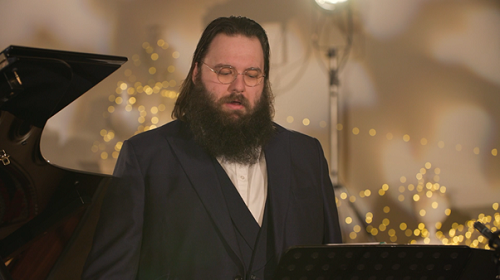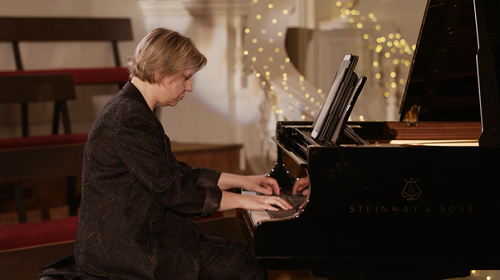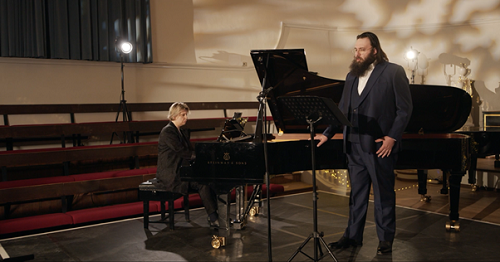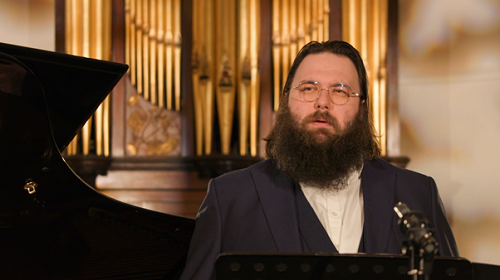The second day of Oxford Lieder’s two-day festival, Winter into Spring, heralded the arrival of the season of rebirth and renewal. If the programme presented by bass James Platt and pianist Lada Valešová in the penultimate recital of the festival didn’t quite ‘fit’ neatly into this theme (Platt was deputising for the indisposed Natalya Romaniw), then there can have been few who were not delighted to have the opportunity to hear Platt’s eloquent interpretation of Shostakovich’s 1936 settings of four poems by Pushkin, with which the recital began.
The Four Romances on Poems by Pushkin Op.46 explore betrayal and regret, mortality and loss. These songs were the only major composition which Shostakovich wrote between the infamous Pravda attack on his Fourth Symphony, and consequent cessation of performances of his opera Lady Macbeth of the Mtsensk District, and the acclaimed Fifth Symphony. Knowing this context, the first Pushkin setting, ‘Rebirth’, becomes revelatory. For, as Pushkin describes the barbarian-artist (Khudozhnik varvar) who, with a ‘lethargic brush’, ‘Scrawls over a painting made by a genius’, we hear the bombastic march of the Fifth Symphony’s Finale. Then, this brash arrogance is quietly defeated by the foreshadowing of the Finale’s mysterious, melancholic central episode, as the vandal’s paint flakes away to reveal ‘the creation of that genius … in its former beauty’: ‘In the same way, delusions disappear/ From my anguished soul.’ An ironic ‘Reply to Just Criticism’, indeed.
In this first song, Platt demonstrated how vocal colour can tell its own story. He delivered the simple melody with understated directness, and a dark glint, but as the alien paint fell from the canvas and the vocal line rose, lightness and lift imbued his voice, and this relaxation and relief were transfigured in the final stanza, as with sweet softness Platt conjured the “Visions of pure and primal days”. The final note slipped away into those dreams, the wistfulness enhanced by Lada Valešová’s delicate, transparent traceries.

‘A youth and a maiden’ is characterised by Shostakovich’s idiosyncratic, and unsettling, blend of irony and pathos. Such tension ran through the piano’s scurrying introduction, indicative of the bitter tears of the jealous maiden who forthrightly upbraids a young man. With firmness and presence, Platt chastised, easing beautifully when the youth falls asleep and the maiden falls silent. He conveyed both tenderness and pain when “she smiled at him,/ Whilst shedding silent tears” and the piano’s unobtrusive closing consonance was consoling yet sad.
Platt put his effortless, powerful projection to good use in ‘Foreboding’, railing against fate and the passing years, the vocal line envigored as the poet-speaker sought to summon the tenacity and pride of youth. Communicating such defiance and determination with beautiful lyricism, Platt revealed inner passions which were further stirred by the restless piano. Then, stillness, and a vision of “My serene and timid angel,/ I bid you quietly say farewell”. An exquisite, floating head voice captured the bittersweetness of the moment, and the piano postlude evoked the poignancy of memory: “the recollection of you/ Will fill my soul,/ In place of the strength, the pride,/ The hope and valour of my youthful days.”

‘Stanzas’ began with a ferocious and relentless low stamp, the sparse counterpoint of the piano’s introduction redolent with anger and the subsequent pounding ostinato rhythms echoing the poet-speaker’s barely subdued rage against mortality. Once more Platt revealed a striking emotional range and an insightful response to the text.
This eloquent receptiveness was sustained through Vaughan Williams’ Songs of Travel, in which an archetypal Romantic wayfarer, the eponymous vagabond of the first song, sets out on a solitary journey, thereafter to be rent between the freedom of the open road and the consolations of love and home.

It was with a sprightly step that our journeyman embarked, at a steady but flowing pace, the piano’s metronomic footsteps ticking briskly and the vocal line resolute but buoyant. Platt was a lyric protagonist, narrating his journey with an air of confidence and purpose: “There’s a life for a man like”, might have been issued with a dismissive toss of Platt’s dark mane, and a subtle portamento underscored the traveller’s certainty: “There’s the life forever.” The animated central section was almost breathless in its haste and defiance, and there was anger in the climactic rebuttal, “Not to autumn will I yield,/ Not to winter even!” The lyric narration continued in ‘Let Beauty Awake’, above the well-defined but gentle sweep of the piano’s rippling arcs. But, if here it was the stars in the west that brought joy to the traveller’s heart, in the following song, ‘The Roadside Fire’, it was thoughts of a life lived beside a loved one that brought warmth and a smile to Platt’s bass. A swift tempo animated the broad vocal phrases and Platt deployed a beautiful pianissimo to make the poetic imagery precious.
In ‘Youth and Love’, however, Vaughan Williams breaks the personal narration and introduces a new, observing voice, the change being embodied also in the freeing of the vocal line, a murmuring declamatory roving, from the regular pulsations of the accompaniment. The fairly slow tempo adopted together with Platt’s vocal restraint served to enhance the air of mystery; it was a pity that Platt didn’t risk the quiet, high D that brings the end of this first section to a floating close, but his tone and phrasing were fittingly enigmatic. Similarly, the rallentando which holds back the more animated central episode – in which the piano’s recollection of fragments from the preceding songs vigorously stirs the traveller’s inner life – began quite early, while the traveller was still singing “a boyish stave”, diminishing the impact of his sudden vanishing, “and his face is gone, is gone”, although Platt’s lovely diminuendo restored some of the magic.

The harmonic wanderings of ‘In Dreams’ sustained the mystery and tension, but ‘The Infinite Shining Heavens’ brought release, Valešová’s celestial sparkles glistening against the rich canvas of Platt’s nocturnal darkness. Another heavenly diminuendo captured the enchantment of the falling star, “Till lo! I looked in the dusk/ And a star had come down to me.”, and the piano’s subtle tierce de Picardie sealed the moment of wonder. ‘Whither must I wander?’ was both beguilingly and imaginatively sung. Platt’s melodies flowed with a folk-singer’s freedom, ritenutos were emphasised, and dynamics sometimes surprised – and captivated, as when the image of “Dear days of old … with faces in the firelight” diminished to suggest the mists of time and memory. Similarly, a broad ritenuto and delayed a tempo made time stand still for the wistful image of a former home, now empty: “Lone let it stand, now the friends are all departed,/ The kind hearts, the true hearts, that loved the place of old.” Loss and acceptance were confirmed in the final, sinking vocal phrase, as Platt descended low and deep, “I go forever and come again no more”.
But, ‘Bright is the ring of song’ reminded us that music preserves what has passed, and though, in the final ‘epilogue’ the wanderer who has “trod the upwards and the downwards slope” tells of his disillusionment, “I have longed for all, and bid farewell to hope”, Platt made the final closing of the door an intimation of renewal. And, with relaxed and burnished voice, Platt closed the recital with Vaughan Williams’ setting of Dante Gabriel Rossetti, ‘Silent Noon’ (from The House of Life), the beauty of the images of ‘long fresh grass’, ‘rosy blooms’ and ‘billowing skies that scatter and amass’ transporting the listener to that pastoral idyll where, “All round our nest, far as the eye can pass,/ Are golden kingcup fields with silver edge/ Where the cow-parsley skirts the hawthorn hedge./ ‘Tis visible silence, still as the hour glass.”
Oxford Lieder’s Winter into Spring festival is available to view on demand until 21st March 2021.
Claire Seymour
James Platt (bass), Lada Valešová (piano)
Shostakovich: Four Romances on Poems by Pushkin Op.46 (1. Vozrozhdenie, ‘Rebirth’; 2. Iunoshu, gor’ko rydaia, ‘A youth and a maiden’; 3. Predchuvstvie, ‘Foreboding’; 4. Stantsy, ‘Stanzas’)
Vaughan Williams: Songs of Travel (1. The vagabond, 2. Let Beauty awake, 3. The roadside fire, 4. Youth and love, 5. In dreams, 6. The infinite shining heavens, 7. Whither must I wander?, 8. Bright is the ring of words, 9. I have trod the upward and the downward slope); ‘Silent Noon’ (from The House of Life)
Holywell Music Room, Oxford; live stream, Sunday 28th February 2021.
ABOVE: James Platt (bass), Lada Valešová (piano)